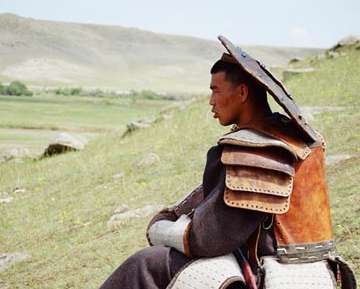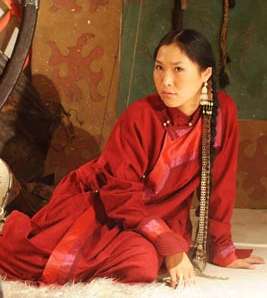Sylvain
Richard is a film critic at Arts & Opinion. He
gave By The Will of Genghis Kahn, which played at
the 2009
Montreal World Film Festival, 3.5 out of 4
stars. For the rest of his ratings, click HERE.
 As
it concerns the great warriors of the past (Genghis Kahn,
Hannibal, Alexander The Great), in film they are often portrayed
as no more than the sum of their stereotypes: men who are
gods in their time, strong when strength is asked for, fearless
when fear spells defeat, and inspirational when bold leadership
is the difference between life and death of a culture or dynasty.
These natural born leaders are the products of warrior culture
and the inflexible codes and protocols upon which empires
or dynasties are founded.
As
it concerns the great warriors of the past (Genghis Kahn,
Hannibal, Alexander The Great), in film they are often portrayed
as no more than the sum of their stereotypes: men who are
gods in their time, strong when strength is asked for, fearless
when fear spells defeat, and inspirational when bold leadership
is the difference between life and death of a culture or dynasty.
These natural born leaders are the products of warrior culture
and the inflexible codes and protocols upon which empires
or dynasties are founded.
Andrei
Borisov’s epic, By The Will of Genghis Kahn,
is a refreshing departure from the formula burdened warrrior
film that chronologically charts the indefatigable warrior
bucking the odds, embracing his exceptionality, and through
sheer will and blood, forging the empire or dynasty with which
his name will be forever associated.
Borisov,
instead, dwells on the early years of of Genghis Kahn (1162-1227,
birth name Temujin) and provides detail and complexity that
make this work as much a character study as an excuse to wage
spectacular battle scenes, of which there are several and
they are thoroughly enjoyable.
The
film opens with Khan’s father being defeated, the birth
of his son and the very special relationship the boy is to
have with his mother, who at an early age senses her child
is exceptional. Filling in the many gaps of Khan’s early
life, we learn that religion played an important part in the
boy’s formation, that he was exposed to a strict moral
code, and he was sensitive to the quiet beauty of his surroundings,
which disposed him to first seek peaceful solutions to the
problems at hand. Genghis Khan is not a savage looking for
an excuse to overpower or eliminate all those who don’t
bend to his will. He is a complex man who understands the
reach of negotiation, which is always his first preference.
In the establishment of the Mongolian empire, which he single-handedly
accomplished by uniting the region’s warring tribes,
he conquers some of them through the force of his personality,
others with muscle and blade. In his wisdom, he did not impose
his belief system or way of life on his subjugates.

This
sprawling
film does several things better than well. The dialogue, much
of it subtitled in the many languages that are bandied about,
isn’t wooden (à la Charlton Heston and Victor
Mature) or stilted; the well choreographed battle scenes aren’t
glamourized. The viewer is brought face to face with fear
and death, and the sheer brutality and dehumanizing aspect
of war (of all wars); and finally, we never lose sight of
the real life personality of the main characters.
In the film’s most important relationship, between Khan
and his blood brother Jamuka, who saved the former from drowning
when they were kids, Khan’s master plan of uniting the
tribes is not well received by Jamuka, who eventually betrays
him, and then goes on to steal his wife. It redounds to the
director’s feeling for narrative that this complex relationship
is revealed through argument and conversation before the inevitable
bloody confrontation; and that, true to character, Khan exhausts
all peaceful solutions before unleashing the sword.
The
second best reason for viewing the film are the spectacular
locations, set in the Gobi desert, the Mongolian Steppes and
the ice-covered Kihlyakh mountains in Yakutia. The natural
beauty is so integrated into the story line, in and of itself
it almost compels the notion of empire as a duty owed to landscape.
For this felicitous result, Borisov deserves high marks, for
a film that compares favourably with El Cid, regarded
as a genre classic. We note that in both films that the benevolent
sword produces the most lasting result.